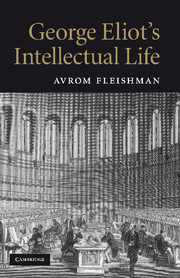Book contents
- Frontmatter
- Contents
- Acknowledgements
- Preface
- Introduction
- 1 The “Evangelical”: starting out in a Christian culture
- 2 The Apostate: moving beyond the Christian mythos
- 3 The Journalist: editing, reviewing, shaping a worldview
- 4 The Germanist: balancing the counterweight of German thinkers
- 5 The Novelist: mixing realism, naturalism and mythmaking
- 6 The Historian: tracking ideals – utopian and national – in Romola and The Spanish Gypsy
- 7 The “Radical”: taking an anti-political stance in Felix Holt
- 8 The Encyclopedist: transcending the past in Middlemarch
- 9 The Visionary: transmitting ideals in Daniel Deronda
- 10 The Intellectual: cultural critique in Impressions of Theophrastus Such
- Notes
- Works cited
- Name index
10 - The Intellectual: cultural critique in Impressions of Theophrastus Such
Published online by Cambridge University Press: 05 April 2010
- Frontmatter
- Contents
- Acknowledgements
- Preface
- Introduction
- 1 The “Evangelical”: starting out in a Christian culture
- 2 The Apostate: moving beyond the Christian mythos
- 3 The Journalist: editing, reviewing, shaping a worldview
- 4 The Germanist: balancing the counterweight of German thinkers
- 5 The Novelist: mixing realism, naturalism and mythmaking
- 6 The Historian: tracking ideals – utopian and national – in Romola and The Spanish Gypsy
- 7 The “Radical”: taking an anti-political stance in Felix Holt
- 8 The Encyclopedist: transcending the past in Middlemarch
- 9 The Visionary: transmitting ideals in Daniel Deronda
- 10 The Intellectual: cultural critique in Impressions of Theophrastus Such
- Notes
- Works cited
- Name index
Summary
With the publication of Daniel Deronda in 1876, George Eliot's career as a major novelist comes to an end. There exist notes she made toward another novel, set in the Napoleonic period, but not detailed enough to tell us much of what she had in mind. She continued an active publishing career, not only in the essays of Impressions of Theophrastus Such (1878) but in editing the last volumes of Lewes's Problems of Life and Mind from his manuscripts after his death in 1878. But a note of exhaustion, already sounded in Deronda, is perceptible, and we may excuse an author who has accomplished so much in a relatively brief career for narrowing his or her sights. She now began a new phase of her career, as an intellectual critic, in a sense to be defined.
Eliot had, of course, always been an intellectual during her mature years, in the several categories named by the titles of the preceding chapters. As some of these terms are not invariably associated with intellectuals, I shall revert to the discussion of them in the Introduction in hopes of clarifying their nature. It will be recalled (although after the many intervening pages, it may be worth repeating) that I've invoked Stefan Collini's three definitions: intellectuals honorifically defined as people with ideas (the “subjective” sense of the term), functionally defined by their playing necessary roles in any society (the “sociological” sense), and dynamically defined as exerting influence in public contexts (the “cultural” sense).
- Type
- Chapter
- Information
- George Eliot's Intellectual Life , pp. 218 - 251Publisher: Cambridge University PressPrint publication year: 2010



